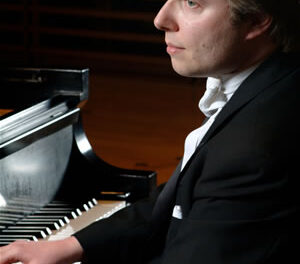This preview has been provided by the Raleigh Chamber Music Guild.
Anyone at all familiar with the Harlem String Quartet understands the group is not so much an ensemble as it is an entire way of viewing the musical world. The quartet weaves together Classical, Romantic and Contemporary chamber music into a sonic tapestry that is quintessentially American. Whether interpreting works by Joseph Haydn or Wynton Marsalis, the Harlem brings a rare brand of accessibility to its playing. Its concert on November 23rd as part of the Raleigh Chamber Music Guild’s Masters Series promises to be the same romp through music history Triangle audiences enjoyed in the group’s prior appearances here in 2010 and 2011.
And joining these friends of the Guild this time around is another face not unfamiliar to local concert-goers: the venerable pianist Misha Dichter.
“We’ve been working with Misha since 2009,” says Melissa White, second violinist for the Harlem. “He’s become a friend of ours.” Dichter and the quartet share the same management firm, a fact that smoothed the path to chamber music for Dichter, who is known mostly as either a soloist or duo pianist with his wife, Cipa. There are both stylistic and generational synergies at work in his collaboration with the Harlem Quartet. Dichter’s career skyrocketed in 1966 with his triumph at the International Tchaikovsky Competition in Moscow, nearly two decades before White was even born. “He has that old-school musicality about him,” White says of Dichter. His exacting standards are reminiscent of those of music school mentors White fondly recalls. “It’s what we remember when we were students,” she says of Dichter’s seasoned professionalism. “It’s really fun to play with Misha.”
In Raleigh, the Harlem and Dichter will perform together in two quintets: Schumann’s Piano Quintet in E flat major, Op. 44, and Dvorak’s Piano Quintet in A major, Op. 81. The Schumann work is a melodic tour de force. “There are a lot of what I like to call them ‘yummy melodies’ — one right after another,” White says. The first movement’s florid romance, for example, is followed by a funeral march in the second. “The third movement brings life back, and the last movement ends joyfully,” White says. “It’s extremely satisfying to play and to listen to.” The sheer beauty of Dvorak’s Op. 81 makes it a defining work of Romantic-era chamber music. “It’s very typical of Dvorak,” White says. Recurrences mark the piece’s thematic landscape. “You get nice melodies and you get to hear them again,” she says. “They become an old friend.”
The Harlem Quartet will also perform, without Dichter, “Adventures of Hippocrates” by Chick Corea (b. 1941). The 19-minute piece, a lighthearted and occasionally sultry suite of modern dance tunes, is emerging as the group’s signature piece. “It is quickly becoming one of our staples,” White says. Composed in 2004, it features a fragmented instrumentalism that is a key element of its composer’s jazzy thumbprint. “It’s Chick’s language, which is unique and personal,” says White. The quartet performed “Adventures of Hippocrates” – which takes its name from a 1950s sci-fi novel by L. Ron Hubbard – at a Chamber Music America award ceremony for Corea in 2010. After the performance, “he was so excited, and that began our relationship with Chick,” recalls White. The group then worked with the piano-jazz icon on his “Mozart Goes Dancing,” which fetched the 2013 Grammy Award for Best Instrumental Composition. It was Corea’s first Grammy win as a composer. White and her group even toured Japan with Corea. “He took us under his wing and showed us all his favorite places.”
The Harlem Quartet has undergone personnel changes since last appearing in Raleigh. In 2012, White and first violinist Ilmar Gavilan, both founding members, were joined by violist Jaime Amador and Matthew Zalkind on cello. To four built immediate chemistry while spending a week together in close quarters working and recording with a tuba player at a house in Big Rapids, Mich., as part of the Tuba Bach Festival. After work, they would share cooking duties and watch movies. “We were like a family for a week,” White says. The comic oddness of a “tuba quintet” – which White says “sounded like movie music” – helped integrate Amador and Zalkind into the Harlem’s progressive ethos. “It took a lot of humor to get through that,” says White. “After that week, we knew if we could do that, we could do anything.”
Formed in 2006, the Harlem Quartet has performed in 45 of the 50 states. The group ended its association with the Detroit-based Sphinx Organization four years ago, opting instead to become ensemble-in-residence at the New England Conservatory’s prestigious Professional String Quartet Training Program in Boston. The quartet continues touring extensively; early next year the group takes its genre-blending repertoire to Calgary and Hawaii (its 46th state). “We love our balance of jazz and classical,” White says. She and her colleagues strive to “help break down walls between audiences.” Perhaps someday their approach will become less the exception and more the rule. It boils down to simply making audience members feel welcome, says White. “We would love to start influencing younger musicians and have this be the way.”
While in Raleigh, Misha Dichter will lead a Raleigh Chamber Music Guild master class for advanced piano students on Saturday, November 22nd, at Saint Mary’s School from 4:00 to 6:00 p.m. The public is invited to observe the class at no charge. The Harlem Quartet will appear at a mini-residency on Monday, November 24th, at Ligon GT Magnet Middle School. Their appearance that day in front of area students is part of the Guild’s education and community outreach program.
For additional information, visit www.rcmg.org
Lawrence Bivins, vice president of the
Raleigh Chamber Music Guild. Reach him at info@rcmg.org












